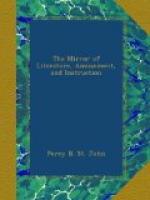“Thus homeward as she hopeless went,
The churchyard path along,
The blast grew cold, the dark owl scream’d
Her lover’s funeral
song.”
Amongst the numberless verses which might be quoted against the family of the owl, I think I only know of one little ode which expresses any pity for it. Our nursery maid used to sing it to the tune of the Storm, “Cease rude Boreas, blust’ring railer.” I remember the first two stanzas of it:—
“Once I was a monarch’s daughter,
And sat on a lady’s
knee;
But am now a nightly rover,
Banish’d to the ivy
tree—
Crying,
hoo hoo, hoo hoo, hoo hoo,
Hoo
hoo hoo, my feet are cold!
Pity
me, for here you see me,
Persecuted,
poor, and old.”
I beg the reader’s pardon for this exordium. I have introduced it, in order to show how little chance there has been, from days long passed and gone to the present time, of studying the haunts and economy of the owl, because its unmerited bad name has created it a host of foes, and doomed it to destruction from all quarters. Some few, certainly, from time to time, have been kept in cages and in aviaries. But nature rarely thrives in captivity, and very seldom appears in her true character when she is encumbered with chains, or is to be looked at by the passing crowd through bars of iron. However, the scene is now going to change; and I trust that the reader will contemplate the owl with more friendly feelings, and quite under different circumstances. Here, no rude schoolboy ever approaches its retreat; and those who once dreaded its diabolical doings are now fully satisfied that it no longer meddles with their destinies, or has any thing to do with the repose of their departed friends. Indeed, human wretches in the shape of body-snatchers seem here in England to have usurped the office of the owl in our churchyards; “et vendunt tumulis corpora rapta suis."[7]
Up to the year 1813, the barn owl had a sad time of it at Walton Hall. Its supposed mournful notes alarmed the aged housekeeper. She knew full well what sorrow it had brought into other houses when she was a young woman; and there was enough of mischief in the midnight wintry blast, without having it increased by the dismal screams of something which people knew very little about, and which every body said was far too busy in the churchyard at nighttime. Nay, it was a well-known fact, that if any person were sick in the neighbourhood, it would be for ever looking in at the window, and holding a conversation outside with somebody, they did not know whom. The gamekeeper agreed with her in every thing she said on this important subject; and he always stood better in her books when he had managed to shoot a bird of this bad and mischievous family. However, in 1813, on my return from the wilds of Guiana, having suffered myself, and learned mercy, I broke in pieces the code of penal laws which




